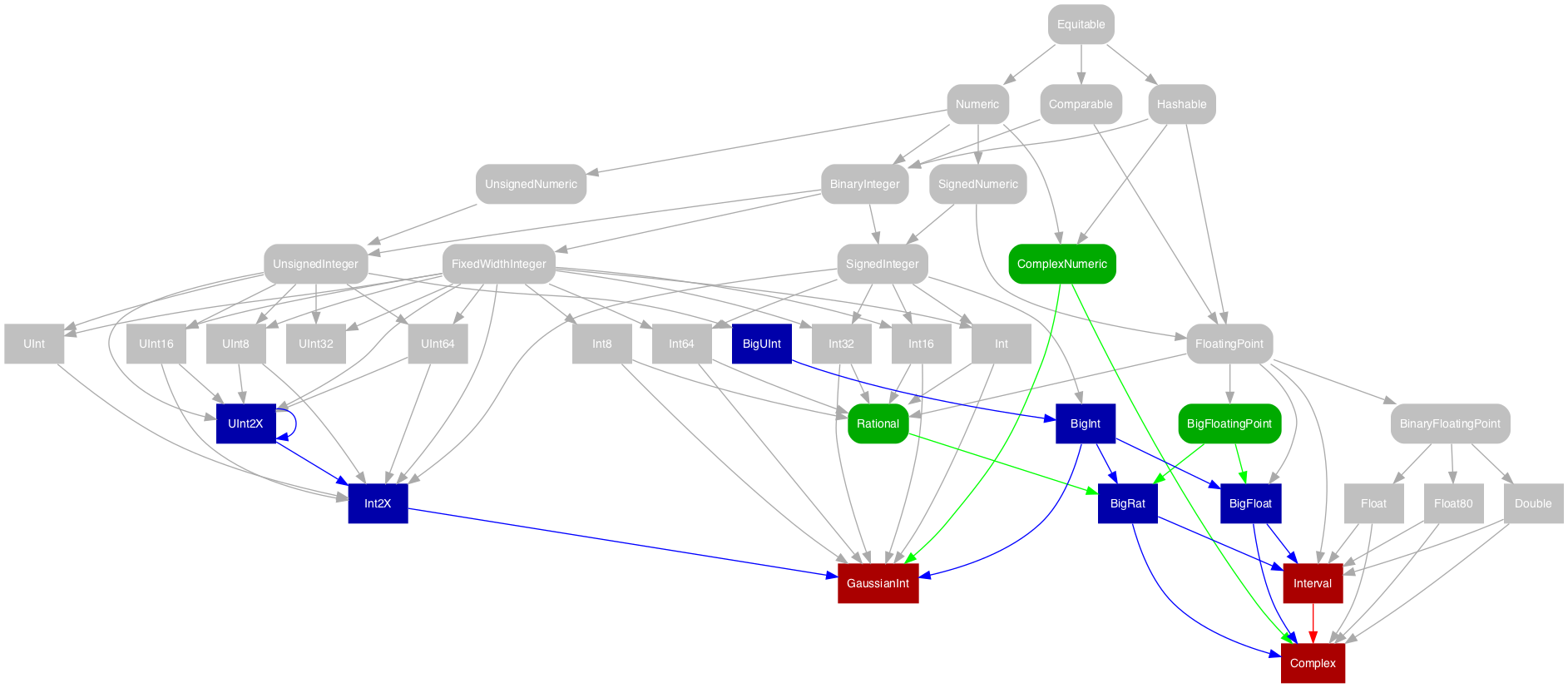PONSにUInt128を加えてみました。
任意精度をサポートしているのに、なぜ?
そこにAccelerateがあったから。
Accelerateは本来ヴェクター演算に用いられるライブラリ。とは言っても裸に近いライブラリで、生で食すと腹が壊れかねないので(下記コードで生っぷりの片鱗を見ることができます)、SwiftでもSurgeとか有名なラッパーが出てます。
このAccelerate、実は小さな数をまとめて処理するだけではなく、大きな数を処理する機能も入ってたりします。ただし現時点で OS X のみ。
ならば…
- OS X では Accelerate を使って
- それ以外では BigInt に計算代行してもらえば
安価に(128|256|512)bit固定長整数が手に入るんじゃね?
と先ほど思い立ってやってみたら実に安上がりに出来ました。とりあえずUInt128から。
public struct UInt128 : POUInt {
public typealias IntType = BigInt
public static let precision = 128
public static let allZeros = UInt128(0)
public typealias DigitType = BigUInt.DigitType
public var value:(DigitType, DigitType, DigitType, DigitType) = (0, 0, 0, 0)
public init(_ d0:DigitType, _ d1:DigitType, _ d2:DigitType, _ d3:DigitType) {
self.value = (d0, d1, d2, d3)
}
public init(_ u128:UInt128) {
self.value = u128.value
}
public init(_ bu:BigUInt) {
let d = bu.digits
switch d.count {
case 1: value = (d[0], 0, 0, 0)
case 2: value = (d[0], d[1], 0, 0)
case 3: value = (d[0], d[1], d[2], 0)
default:value = (d[0], d[1], d[2], d[3])
}
}
public init(_ u:UIntMax) {
value.0 = DigitType(u & 0xffff_ffff)
value.1 = DigitType(u >> 32)
}
public init(_ u:UInt) {
self.init(BigUInt(u))
}
public init(_ i:Int) {
if i < 0 {
fatalError("\(i) < 0")
}
self.init(BigUInt(i.abs))
}
public var inBigUInt:BigUInt {
return BigUInt(rawValue:[value.0, value.1, value.2, value.3])
}
public var asBigUInt:BigUInt? {
return self.inBigUInt
}
public func toUIntMax()->UIntMax {
if value.2 != 0 || value.3 != 0 {
fatalError("\(self) > UIntMax.max = \(UIntMax.max)")
}
return UIntMax(value.1)<<32 | UIntMax(value.0)
}
public func toIntMax()->IntMax {
return IntMax(self.toUIntMax())
}
public var asUInt32:UInt32? {
if value.1 != 0 || value.2 != 0 || value.3 != 0 {
return nil
}
return value.0
}
public var msbAt:Int {
return value.3 != 0 ? 96 + value.3.msbAt
: value.2 != 0 ? 64 + value.2.msbAt
: value.1 != 0 ? 32 + value.1.msbAt
: value.0.msbAt
}
public var asSigned:IntType? {
return self.inBigUInt.asSigned
}
public static let min = UInt128(0)
public static let max = UInt128(BigUInt(1)<<128-1)
public static func divideWithOverflow(lhs:UInt128, _ rhs:UInt128)->(UInt128, overflow:Bool) {
return (divmod(lhs, rhs).0, false)
}
public static func remainderWithOverflow(lhs:UInt128, _ rhs:UInt128)->(UInt128, overflow:Bool) {
return (divmod(lhs, rhs).1, false)
}
}
public func ==(lhs:UInt128, rhs:UInt128)->Bool {
let lv = lhs.value
let rv = rhs.value
return lv.0 == rv.0 && lv.1 == rv.1 && lv.2 == rv.2 && lv.3 == rv.3
}
public func <(lhs:UInt128, rhs:UInt128)->Bool {
return UInt128.subtractWithOverflow(lhs, rhs).1
}
public prefix func ~(u128:UInt128)->UInt128 {
return UInt128(~u128.value.0, ~u128.value.1, ~u128.value.2, ~u128.value.3)
}
public func &(lhs:UInt128, rhs:UInt128)->UInt128 {
return UInt128(
lhs.value.0 & rhs.value.0,
lhs.value.1 & rhs.value.1,
lhs.value.2 & rhs.value.2,
lhs.value.3 & rhs.value.3
)
}
public func |(lhs:UInt128, rhs:UInt128)->UInt128 {
return UInt128(
lhs.value.0 | rhs.value.0,
lhs.value.1 | rhs.value.1,
lhs.value.2 | rhs.value.2,
lhs.value.3 | rhs.value.3
)
}
public func ^(lhs:UInt128, rhs:UInt128)->UInt128 {
return UInt128(
lhs.value.0 ^ rhs.value.0,
lhs.value.1 ^ rhs.value.1,
lhs.value.2 ^ rhs.value.2,
lhs.value.3 ^ rhs.value.3
)
}
見ての通り、BigUIntが[UInt32]で持っている数値の内部表現(単なる(2**32)進法の数値)を(UInt32, UInt32, UInt32, UInt32)で持たせているだけです。
あとは、難しそうな演算はBigUIntか…
#if !os(OSX) // slow but steady BigInt arithmetics
public extension UInt128 {
public static func addWithOverflow(lhs:UInt128, _ rhs:UInt128)->(UInt128, overflow:Bool) {
let (bu, overflow) = BigUInt.addWithOverflow(lhs.inBigUInt, rhs.inBigUInt)
return (UInt128(bu), overflow || bu.digits.count > 4)
}
public static func subtractWithOverflow(lhs:UInt128, _ rhs:UInt128)->(UInt128, overflow:Bool) {
let (bu, overflow) = BigUInt.subtractWithOverflow(lhs.inBigUInt, rhs.inBigUInt)
return (UInt128(bu), overflow || bu.digits.count > 4)
}
public static func multiplyWithOverflow(lhs:UInt128, _ rhs:UInt128)->(UInt128, overflow:Bool) {
let (bu, overflow) = BigUInt.multiplyWithOverflow(lhs.inBigUInt, rhs.inBigUInt)
return (UInt128(bu), overflow || bu.digits.count > 4)
}
public static func divmod(lhs:UInt128, _ rhs:UInt128)->(UInt128, UInt128) {
let (q, r) = BigUInt.divmod(lhs.inBigUInt, rhs.inBigUInt)
return (UInt128(q), UInt128(r))
}
}
public func <<(lhs:UInt128, rhs:UInt128)->UInt128 {
return UInt128( lhs.inBigUInt << rhs.inBigUInt )
}
public func >>(lhs:UInt128, rhs:UInt128)->UInt128 {
return UInt128( lhs.inBigUInt >> rhs.inBigUInt )
}
Accelerateに投げるだけ。
#else // fast arithmetics via Accelerate. OS X only
import Accelerate
public extension UInt128 {
public static func addWithOverflow(lhs:UInt128, _ rhs:UInt128)->(UInt128, overflow:Bool) {
var a = unsafeBitCast((lhs, vU128()), vU256.self)
var b = unsafeBitCast((rhs, vU128()), vU256.self)
var ab = vU256()
vU256Add(&a, &b, &ab)
let (r, o) = unsafeBitCast(ab, (UInt128, UInt128).self)
return (r, o != 0)
}
public static func subtractWithOverflow(lhs:UInt128, _ rhs:UInt128)->(UInt128, overflow:Bool) {
var a = unsafeBitCast((lhs, vU128()), vU256.self)
var b = unsafeBitCast((rhs, vU128()), vU256.self)
var ab = vU256()
vU256Sub(&a, &b, &ab)
let (r, o) = unsafeBitCast(ab, (UInt128, UInt128).self)
return (r, o != 0)
}
public static func multiplyWithOverflow(lhs:UInt128, _ rhs:UInt128)->(UInt128, overflow:Bool) {
var a = unsafeBitCast(lhs, vU128.self)
var b = unsafeBitCast(rhs, vU128.self)
var ab = vU256()
vU128FullMultiply(&a, &b, &ab)
let (r, o) = unsafeBitCast(ab, (UInt128, UInt128).self)
return (r, o != 0)
}
public static func divmod(lhs:UInt128, _ rhs:UInt128)->(UInt128, UInt128) {
var a = unsafeBitCast((lhs, vU128()), vU256.self)
var b = unsafeBitCast((rhs, vU128()), vU256.self)
var (q, r) = (vU256(), vU256())
vU256Divide(&a, &b, &q, &r)
return (unsafeBitCast(q, (UInt128, UInt128).self).0, unsafeBitCast(r, (UInt128, UInt128).self).0)
}
}
public func <<(lhs:UInt128, rhs:UInt128)->UInt128 {
var a = unsafeBitCast((lhs, vU128()), vU256.self)
var r = vU256()
vLL256Shift(&a, rhs.asUInt32!, &r)
return unsafeBitCast(r, (UInt128, UInt128).self).0
}
public func >>(lhs:UInt128, rhs:UInt128)->UInt128 {
var a = unsafeBitCast((lhs, vU128()), vU256.self)
var r = vU256()
vLR256Shift(&a, rhs.asUInt32!, &r)
return unsafeBitCast(r, (UInt128, UInt128).self).0
}
#endif
これでもう128bit符号なし整数が手に入りました。演算子はもちろんのこと、POUIntにある関数やメソッドは全て使えますし、POUInt以上のProtocolを拡張すれば、その恩恵が即座に降りてきます。
6> (UInt128(1)<<127 - UInt128(1)).isPrime
$R2: Bool = true
1> import PONS
2> func fib<T:POInteger>(n:T)->T { // with a little better algorithm
3. if n < T(2) { return n }
4. var (a, b) = (T(0), T(1))
5. for _ in 2...n {
6. (a, b) = (b, a+b)
7. }
8. return b
9. }
10> fib(94 as UInt128).description
$R0: String = "19740274219868223167"
11> fib(186 as UInt128).description
$R1: String = "332825110087067562321196029789634457848"
12> fib(187 as UInt128).description
fatal error: overflow: 205697230343233228174223751303346572685 + 332825110087067562321196029789634457848: file pons/pointeger.swift, line 55
Execution interrupted. Enter Swift code to recover and continue.
Enter LLDB commands to investigate (type :help for assistance.)
で、気になる速度の方は…
fact(34 as UInt128) == 295232799039604140847618609643520000000
UInt128: 22692.6435500538 ops/s (0.0440671443939209s for 1000ops)
BigUInt: 3997.31625495578 ops/s (0.250167846679688s for 1000ops)
UInt128/BigUInt == 5.67696977238667
UInt128で行ける最大の階乗34!を33!で割らせるという演算で、BigUIntの6倍弱ほど速くなってます。
Accelerateの恩恵を受けられない場合でも…
fact(34 as BigUInt) == 295232799039604140847618609643520000000
UInt128: 6954.48244758816 ops/s (0.143792152404785s for 1000ops)
BigUInt: 8128.55913611733 ops/s (0.12302303314209s for 1000ops)
UInt128/BigUInt == 0.85556152463572
と極端には遅くなりません。つうか通常のBigUInt(同一マシンのVM上の)Linuxの方が速いんでやんの。まあSwiftのバージョン自体見ての通りXcodeより新しいんですが。
PONSの面目躍如。まさにこういうことをするために作ったんですよ。
Enjoy!
Dan the Protocol-Oriented Swift Programmer
